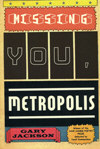Missing You, Metropolis
In Missing You, Metropolis, the 2009 winner of the Cave Canem Poetry Prize, first-time poet Gary Jackson uses the motif of comic book lore, with its hopeful yet unforgiving treatment of the superhero, to speak about childhood feelings of isolation and sexual maturation against the backdrop of a racist culture. Sometimes the speaker uses the comic book theme as a protective blanket, relying on the fantasy world it offers to escape the harsher elements of life that children often fail to understand. At other times, seeing the world through the anvil-heavy metaphors of the graphic novel helps the speaker come to terms with his actual environment. Good and evil are drastically polarized in this genre, which offers straightforward solutions to worldwide problems and therefore appeals to a child’s sense of simple justice.
Jackson proves adept at operating on many levels at once, conveying the naïveté of youth while speaking from the informed adult perspective. Under the surface of his colloquial verse lurks an unfulfilled eagerness to exist in that dreamlike landscape that previously cultivated his idea of manhood. Once he discovers that manhood is nothing like what the stories indicate, he feels convinced that he must have missed something, and these poems chart the course of his retrograde exploration. He expresses this overarching sentiment in the book’s epigraph, which quotes Alan Moore and Dave Gibbons’ Watchmen: “All those brilliant and resourceful sleuths and heroes offered a glimpse of a perfect world where morality worked the way it was meant to… Which world would you rather live in, if you had the choice?”
Jackson sets out to answer this question for himself and present an argument to his readers, considering how “[the] old comics were never wrong. / Right always defended / by the hero,” and telling himself that “I’d trade my job, my BA, // hell even my wife, anything to climb walls, / spin webs, touch rooftops with toes.” At the same time, the speaker acknowledges the tedium of perfection in such poems as “When Loving a Man Becomes Too Hard” and “The Dilemma of Lois Lane,” wherein Superman’s girlfriend ponders the gulf that separates her from her lover:
…Sometimes,
when we’re alone at home,
fixing dinner, you’ll pretend
to wince when you cut yourself,
and I find myself hoping
that the tiniest drop of blood
will bloom on your finger.
For Lois Lane, such a benign injury would constitute a celebration, a spring-like rebirth in the fashion of blossoming flowers. It would breathe new, human life into the otherwise “solid as diamonds” Superman, making them more alike.
In Jackson’s poetry, “blood” often indicates a merger between two unlike things that have enough in common to potentially confound an observer (as opposed to “skin,” which is used to solidify an impenetrable border). If one didn’t know better, one would observe no immediate visual, tactile, or otherwise sensory difference between Lane and her otherworldly boyfriend; but, as it stands, the two are separate enough to require this pinprick of blood to unite them. In the same vein, Jackson argues, if you don’t scrutinize too closely, the worlds of fantasy and reality can blur until they are indistinguishable. While describing the harmless pastime of reading a graphic novel in “The Secret Art of Reading a Comic,” the book’s opening poem, the speaker compares comics to
…treats, delicious twenty-two-page
snacks we swallow, never questioning
the action between the panels’ gutters
and how similar that world bleeds
into our own.
These worlds are separated by a membrane that can rupture, allowing its contents to seep, or “bleed,” into something else that is also wounded, imperfect, and reveals an opening in its figurative flesh—here, reality, which invites the warm, liquid rush of fantasy because it is so flawed in itself.
In “Reading Comic Books in the Rain,” the poem that ends the collection, both nothing and everything has changed for the speaker. After years of feeling like a mutant from X-Men—most notably the character Storm, whose “almond skin” is “no different from ours save a darker ink,” yet who is still eternally showcased like the Hottentot Venus, placed “on display” for “marvelous / wonder” and pre-pubescent sexual fantasies—he finally understands that merger into “that four-color world” of the comic book is possible, but unsustainable. He would like to take his partner, “the girl who has mashed her cheek / into my wet shoulder,” and
…Escape for as long
as we could. Stave off Topeka, Kansas,
the whole goddamn world, by falling
into another one. The panels may bleed
beyond their borders, but stay contained in our hands.
It may sound like he gives himself over to this conclusion easily, considering his lifelong struggle with the motif (plus a formidable frustration with the hand fate dealt him), but the beauty of Jackson’s speaker lies in his tender resignation. Though contrary and restless, he is chiefly pensive, curious, reasonable, and forgiving. His frustration never crosses the line into unbridled emotion, which allows Jackson’s poetry to stand out with the kind of measured clarity and brilliant vision his unique subject and universal sentiment demand.





